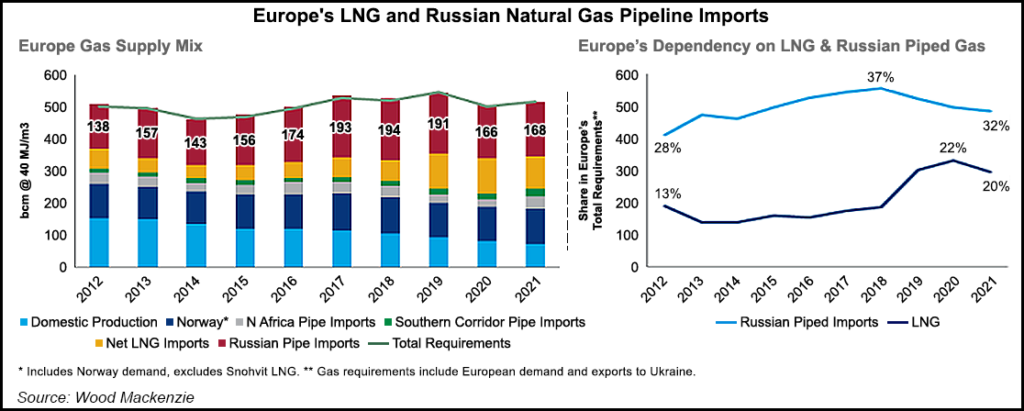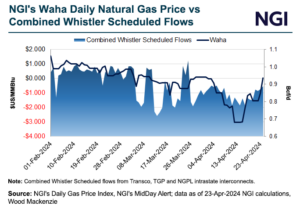International | LNG | LNG Insight | NGI All News Access | NGI The Weekly Gas Market Report
Germany Warns of Possible Russian Natural Gas Supply Cuts, Sending European Prices Higher
Germany on Wednesday triggered the first level of its emergency plan for natural gas as Russia continues with mixed messaging about whether it could require payment in rubles for deliveries to Europe.

Germany’s Federal Ministry for Economic Affairs and Climate Action took a precautionary step and initiated the first early warning level of its emergency response plan. The warning level means Germany has convened a crisis team that will meet regularly to monitor the gas market more closely.
Fears are growing that Russia could cut off supplies to the continent if payments are not received in Rubles from “unfriendly countries” in Europe following an order by President Vladimir Putin last week. The ruble has suffered following a wave of economic sanctions imposed by Western governments in response to Russia’s invasion of Ukraine.
Russia provides roughly 40% of all European natural gas imports. The European benchmark Title Transfer Facility contract surged on Germany’s decision, with the May contract gaining roughly $4 on Wednesday to finish above $39/MMBtu. Russian natural gas flows to the continent are currently stable.
Kremlin spokesman Dimistry Peskov walked back the urgency of Putin’s demand for ruble payments on Wednesday, saying the country would not require buyers to pay in the currency anytime soon. Gazprom PJSC, along with the Russian central bank and government, are expected to unveil proposals for implementing the payments as early as Thursday.
The natural gas market was also jolted after Peskov said there had been no significant progress at peace talks in Turkey this week, despite Ukrainian claims and news media reports to the contrary.
Trading firm Energi Danmark said Wednesday that the “market continues to fear” natural gas supplies “will come to a complete halt if the war in Ukraine and the diplomatic relations between the European Union and Russia escalate further.”
The major economies of the Group of Seven, which is currently led by Germany, rejected demands for ruble payments earlier this week, saying it would breach existing contracts. Nearly all gas purchase contracts in Europe are denominated in euros and dollars.
“There have been several statements from the Russian side” that if rubles are not received, “deliveries will be stopped,” German Economy Minister Robert Habeck said Wednesday.
The second alert level is triggered in the event of a gas supply disruption, while the highest emergency level is initiated amid high demand and a major supply disruption.
France also was reportedly girding for the possibility of a supply cut on Wednesday as the country’s gas distributor was drawing up plans for the possibility of gas rationing. The Netherlands has reportedly advised residents to limit natural gas consumption as well.
“There are no supply bottlenecks at present,” Habeck said. “Nevertheless, we need to step up our preventive measures in order to be ready to cope with any escalation by Russia.”
© 2024 Natural Gas Intelligence. All rights reserved.
ISSN © 1532-1231 | ISSN © 2577-9877 | ISSN © 1532-1266 |


